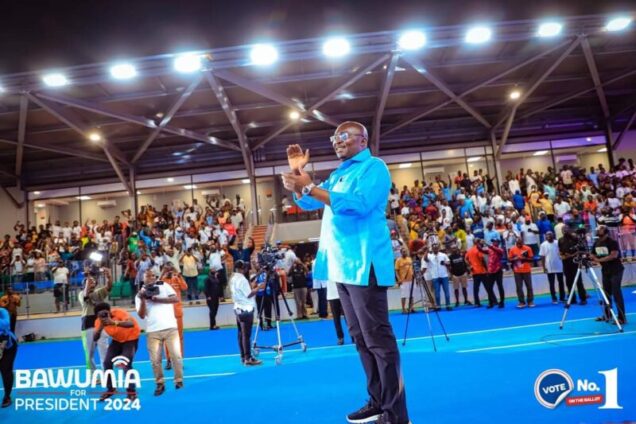
Audio By Carbonatix
Last Sunday, Vice President Dr. Mahamudu Bawumia engaged with Ghanaian youth at the Borteyman Sports Complex in Accra, presenting his plans to prioritise youth development and welfare should he be elected President. Dr. Bawumia emphasised his commitment to empowering the youth through three key pillars: education, skills training, and job creation.
Dr. Bawumia began by highlighting the role of education as a catalyst for youth advancement, pledging significant investments to expand access to education at all levels, especially tertiary education, building on the success of Free SHS. He tied skills training closely to education, focusing on technical and vocational education and training (TVET) and plans to train 1 million young Ghanaians in digital skills.
With these foundations in place, Dr. Bawumia announced that his proposed policies would aim to create millions of jobs across the country. “Once you have an education and employable skills, the next step is to thrive in an economic environment that can generate a large pool of well-paying jobs, whether as an entrepreneur, self-employed, or an employee,” he said.
Here are the eight initiatives Dr. Bawumia outlined:
- Sustain Economic Growth for Business Expansion and Job Creation Dr. Bawumia underscored the need for a stable economic environment to foster business growth and job creation. His government would create a supportive environment for the private sector, which he called the “engine of growth,” and leverage private sector partnerships to reduce government spending on infrastructure projects.
- Expand Public Infrastructure With a focus on creating youth employment, Dr. Bawumia said his government would expand public infrastructure. For instance, he pledged to complete the Agenda 111 hospital projects, which he estimates would create around 72,000 jobs in the health sector.
- Support Businesses for Job Creation Dr. Bawumia proposed a “Buy Ghana First” policy to prioritise locally produced goods and services in public procurement. His government would also establish an SME Bank to meet financing needs of small and medium-sized businesses, which employ over 80% of Ghanaians. Additional incentives would include tax credits for start-ups and affordable power for industries through a restructured tariff system.
- Implement a Simplified Tax System Dr. Bawumia plans to implement a straightforward, business-friendly tax regime. This includes a flat tax rate for individuals and SMEs, as well as a predictable flat-rate duty on imports to stabilise prices. Port charges would be harmonised to match regional standards, particularly with Togo, making duties at Ghanaian ports equal or lower.
- Agricultural Sector Reform for Job Creation Dr. Bawumia expressed his ambition to achieve food security and job creation through modernised agriculture. He pledged to create agricultural enclaves in each region, invest in technology to reduce post-harvest losses, and establish district mechanisation centres. The Agricultural Development Bank (ADB) would also expand support for businesses involved in value-added agricultural products.
- Housing Sector Reform for Job Creation Dr. Bawumia’s housing policy would focus on public housing through partnerships with the private sector, similar to the Singapore model. This initiative, he stated, would provide millions of jobs across trades such as masonry, plumbing, and electrical work. He also proposed further development of the mortgage market by digitising the land registry and simplifying title establishment.
- Reform the Mining Sector for Job Creation In the mining sector, Dr. Bawumia committed to environmentally sustainable small-scale mining practices, with the goal of growing these operations into larger businesses. His government would provide support for training, financing, and capacity building to facilitate this transformation.
- Develop a World-Class Digital Economy The largest job initiative, Dr. Bawumia said, would be a digital skills training programme for 1 million young Ghanaians, preparing them for opportunities in Ghana and abroad. “I want to see Ghana build the digital talent we require for the Fourth Industrial Revolution,” he said. Additionally, his government would establish a Fintech Fund with a US$100 million seed capital to support Ghanaian start-ups developing exportable solutions.
These initiatives, Dr. Bawumia affirmed, are intended to “create the large pool of diverse jobs that the young people of Ghana desire and deserve.” With the December 7, 2024 election approaching, he assured voters that his comprehensive plan represents a path toward meaningful youth employment and economic transformation.
4o
Latest Stories
-
Ghana is rising again – Mahama declares
4 hours -
Firefighters subdue blaze at Accra’s Tudu, officials warn of busy fire season ahead
4 hours -
New Year’s Luv FM Family Party in the park ends in grand style at Rattray park
4 hours -
Mahama targets digital schools, universal healthcare, and food self-sufficiency in 2026
4 hours -
Ghana’s global image boosted by our world-acclaimed reset agenda – Mahama
5 hours -
Full text: Mahama’s New Year message to the nation
5 hours -
The foundation is laid; now we accelerate and expand in 2026 – Mahama
5 hours -
There is no NPP, CPP nor NDC Ghana, only one Ghana – Mahama
5 hours -
Eduwatch praises education financing gains but warns delays, teacher gaps could derail reforms
5 hours -
Kusaal Wikimedians take local language online in 14-day digital campaign
6 hours -
Stop interfering in each other’s roles – Bole-Bamboi MP appeals to traditional rulers for peace
6 hours -
Playback: President Mahama addressed the nation in New Year message
7 hours -
Industrial and Commercial Workers’ Union call for strong work ethics, economic participation in 2026 new year message
9 hours -
Crossover Joy: Churches in Ghana welcome 2026 with fire and faith
9 hours -
Traffic chaos on Accra–Kumasi Highway leaves hundreds stranded as diversions gridlock
9 hours

